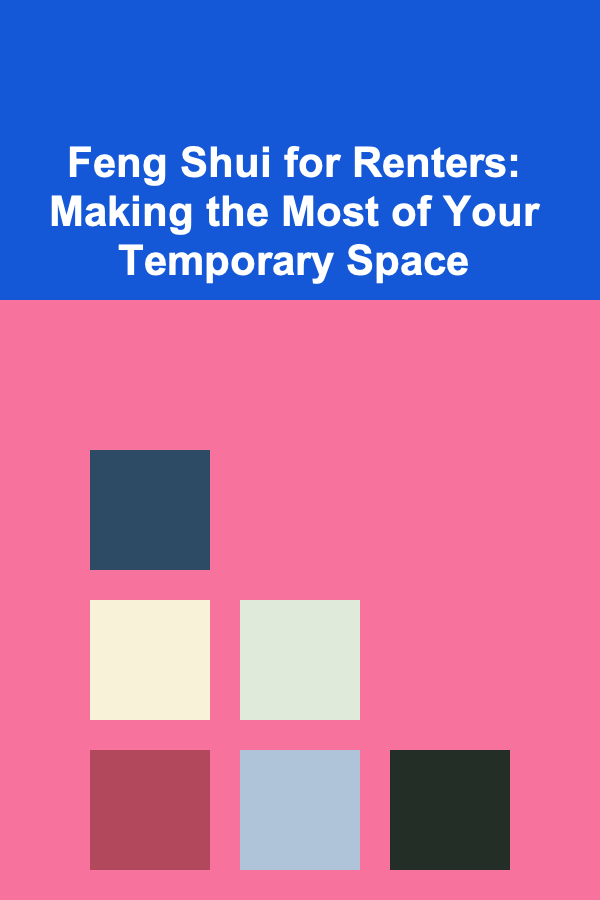
Feng Shui for Renters: Making the Most of Your Temporary Space
ebook include PDF & Audio bundle (Micro Guide)
$12.99$11.99
Limited Time Offer! Order within the next:

Feng Shui is a Chinese philosophy centered on the art of balancing energy, or Chi, in one's environment to promote health, prosperity, and harmony. It's a powerful tool that can improve all areas of life, from relationships to career and overall well-being. The common misconception, however, is that Feng Shui can only be applied to permanent homes or spaces where one has complete control over the environment. But for renters, who often face limitations in terms of design, decor, and alterations, this belief isn't entirely true.
While it may be more challenging for renters to make changes to their space, Feng Shui offers numerous techniques and adjustments that can be applied to even the most temporary living arrangements. In fact, renters can still harness the power of Feng Shui to optimize their living space, improve energy flow, and create an environment that supports their goals and aspirations, no matter how long they intend to stay.
In this comprehensive guide, we'll explore how renters can make the most of their temporary spaces by applying Feng Shui principles in creative and effective ways.
The Fundamentals of Feng Shui
Before diving into specific tips for renters, it's important to understand the basic principles of Feng Shui. At its core, Feng Shui is about creating a harmonious environment that aligns with natural energy forces. Feng Shui practitioners believe that the arrangement of your home, the colors you choose, and even the way you position furniture can significantly impact your health, success, relationships, and overall sense of well-being.
Here are a few key concepts in Feng Shui that renters can use:
1. The Bagua Map
The Bagua map is one of the most important tools in Feng Shui. It divides a space into nine areas, each of which corresponds to different aspects of life, such as career, relationships, wealth, and health. By determining which part of your space aligns with each life area, you can use Feng Shui to enhance specific aspects of your life.
Renters can use the Bagua map by simply overlaying it on the floor plan of their apartment or rental property. You'll need to identify the area of your home that corresponds with each Bagua life aspect, then enhance that sector with the appropriate Feng Shui elements, colors, and decor.
2. Chi Energy
Chi (or Qi ) is the life force energy that flows through everything in the universe. A major goal of Feng Shui is to maintain the flow of Chi in your home. If Chi is blocked or stagnant, it can result in feelings of unease, stress, or even physical illness. On the other hand, if Chi flows freely, it can promote prosperity, health, and happiness.
For renters, ensuring that there's a smooth flow of energy in the living space is crucial. This means keeping the space clean and organized, avoiding clutter, and ensuring that furniture and decor are arranged in a way that allows energy to flow freely throughout the room.
3. The Five Elements
Feng Shui uses five elements -- Wood, Fire, Earth, Metal, and Water -- to balance energy in the environment. Each element is associated with a specific life aspect. For example, Wood is connected to health and family, Fire to fame and reputation, Earth to stability and grounding, Metal to creativity and communication, and Water to career and abundance.
Renters can use these elements to enhance particular areas of their lives by incorporating them into their space through colors, materials, or objects. For example, placing plants (Wood) in the health corner (the far left of the home) or using mirrors (Metal) in the career area (the north corner) can create a harmonious environment.
4. Yin and Yang
Yin and Yang are complementary forces that represent balance. In Feng Shui, it's important to find a balance between the feminine (Yin) and masculine (Yang) energies in your home. Too much Yang (e.g., sharp edges, bright lights, and clutter) can create tension, while too much Yin (e.g., too many dark colors or heavy furniture) can result in stagnation.
Renters can balance the Yin and Yang energy in their spaces by considering both the colors and the type of decor. For example, light and airy furniture, soft fabrics, and natural materials like wood can help create a calming, balanced environment.
Applying Feng Shui to Rental Spaces
Now that we've covered the fundamental concepts of Feng Shui, let's dive into practical tips and strategies that renters can use to create a harmonious, balanced living space. While renters may face limitations due to landlord restrictions, there are still many simple and effective ways to bring positive energy into your home.
1. Focus on the Entryway
The entryway, or front door, is one of the most important areas in Feng Shui. It is the main point where energy enters your home, so it's vital to ensure that this area is clean, welcoming, and free of obstacles. For renters, this may mean adding a fresh coat of paint to the front door (if permitted) or placing a doormat, a vase of fresh flowers, or a piece of artwork to make the entrance feel inviting.
Consider also the positioning of any furniture near the front door. Ideally, your door should open freely, without obstruction, to allow Chi to flow into the home. If your front door is blocked by a large piece of furniture or a pile of shoes, it may prevent the positive energy from entering.
2. Maximize Natural Light and Ventilation
Natural light and fresh air are vital elements in Feng Shui. Light is associated with positivity and energy, while air circulation is necessary to prevent stagnation. Renters who may not be able to make permanent alterations, such as installing new windows or skylights, can focus on maximizing natural light by keeping windows clean and unobstructed. Use sheer curtains or blinds to allow as much light in as possible, and open the windows regularly to let fresh air circulate.
If natural light is limited in certain rooms, renters can supplement the space with well-placed lamps that offer soft, warm lighting. Avoid overly harsh lighting, which can create an uncomfortable and overly yang atmosphere.
3. Declutter and Organize
Clutter is one of the biggest culprits when it comes to blocking the flow of Chi in a space. As a renter, it's essential to keep your space clean, organized, and free of unnecessary items. Not only does this create a more visually pleasing environment, but it also promotes a sense of calm and peace.
Renters can follow a simple rule: If you haven't used an item in the last six months, consider donating it or putting it into storage. In Feng Shui, a clutter-free space symbolizes an open mind, which allows for new opportunities to come into your life.
4. Arrange Your Furniture Thoughtfully
While renters may not be able to make permanent changes to their space, one of the simplest and most effective Feng Shui tips is arranging furniture thoughtfully. The arrangement of furniture impacts the flow of energy in the room, so it's important to place items in a way that promotes harmony and balance.
For example, the bed should be placed in the command position -- meaning that you should be able to see the door from the bed without being directly in line with it. If this is not possible, consider using a mirror to reflect the door's position. This gives you a sense of control and security, which is important for restful sleep.
Similarly, when arranging furniture in a living room, ensure that seating is arranged in a way that promotes conversation and connection. Avoid placing furniture with backs to doors or windows, as this can make people feel vulnerable.
5. Incorporate Feng Shui Colors and Elements
Each area of your rental home corresponds to a different aspect of your life, and you can activate these areas using specific Feng Shui elements and colors. For example, in the career area (the north side of your home), use Water elements (like mirrors, glass, or black colors) to enhance your career energy. In the relationship area (the far right of your home), use Earth elements, such as pottery, crystals, or earthy tones like pink, red, or soft yellow.
Renters can easily incorporate these colors and elements into their decor without making major changes. Adding throw pillows, rugs, and decorative items can help activate different areas of your life. Additionally, renters can use plants and natural materials to introduce the Wood element, which can promote health and vitality.
6. Use Mirrors Wisely
Mirrors are a powerful tool in Feng Shui. They reflect light and energy, and when used properly, they can expand a space and enhance the flow of Chi. However, mirrors must be placed thoughtfully. Avoid placing mirrors opposite doors, as they can reflect the energy right back out of the room. Similarly, avoid mirrors that reflect clutter or the bed, as they can lead to restless energy.
Renters can place mirrors strategically in areas that are meant to enhance wealth, health, or creativity. For example, placing a mirror in the wealth area (the far left corner of your home) can attract abundance and prosperity.
7. Create a Personal Sanctuary
Finally, create a space in your rental that feels like a personal sanctuary -- a place where you can relax and recharge. This could be a small reading nook, a meditation corner, or a cozy area with candles, soft pillows, and soothing colors. In Feng Shui, a personal sanctuary is important for rejuvenation, allowing you to restore balance and well-being after a long day.
This space can also be enhanced with calming elements like plants, water features, or soft textiles that promote relaxation and peaceful energy.
Conclusion
Renters may face unique challenges when it comes to applying Feng Shui in their homes, but with the right mindset and practical strategies, it's entirely possible to create a harmonious, balanced environment. By focusing on the key principles of Feng Shui, such as the Bagua map, energy flow, and the Five Elements, renters can enhance their space and improve various aspects of their lives, from health and relationships to career and personal growth.
Even without making permanent changes to the space, small adjustments like decluttering, optimizing furniture placement, and adding elements that correspond to specific life areas can make a huge difference in how you feel and how energy flows within your home. By embracing Feng Shui, you can make the most of your temporary space, ensuring that it supports your goals and creates a positive, productive environment.

Catalyzing Science: Innovations and Best Practices for Research Scientists
Read More
How to Create a Kid-Friendly Pantry Area
Read More
How to Make Your Family's Weekend Fun with DIY Arts and Crafts
Read More
How to Monetize Your NFT Creations
Read More
How to Prepare Your Home for a New Pet Adoption
Read More
How to Teach Kids About Money and Finance from a Young Age
Read MoreOther Products

Catalyzing Science: Innovations and Best Practices for Research Scientists
Read More
How to Create a Kid-Friendly Pantry Area
Read More
How to Make Your Family's Weekend Fun with DIY Arts and Crafts
Read More
How to Monetize Your NFT Creations
Read More
How to Prepare Your Home for a New Pet Adoption
Read More